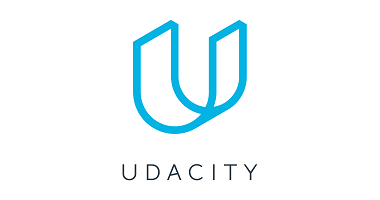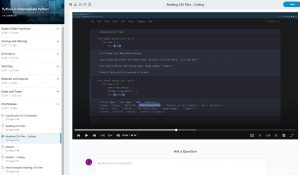Python is a widely popular language used extensively in the financial services industry. From the old banking conglomerates to the new FinTech age start-ups, everyone seems to be loving it. That’s not surprising given Python’s simplistic elegance, versatility and strong financial modelling capabilities.
Python is loved by financial data analysts, traders, cryptocurrency geeks and developers alike. Many fintech jobs or development jobs at banks require it as an essential skill which makes it one of the most in-demand languages for candidates looking for a job opportunity in one of these fields.
It is also a very powerful language and in order to fully utilise its vast potential in finance, programmers have to go beyond the ordinary. The following courses have been cherry picked to provide users with the skills needed to learn Python for financial applications.
1. Introduction to Python from Udacity
Course Review
Python is a rather intuitive language once you get to know it and this course will make you feel comfortable while you learn to do just that. Its a rather gentle yet decisive dive into the world of Python.
This is a beginner friendly course so you don’t really need a lot of prior experience. You get to start your Python journey form the very beginning and reach a level that you should be able to comfortably use your skills in real world settings and even talk about it with authority during job interviews.
The course focuses on python fundamentals like data types, operators, control flow, functions, scripting and so on. You dont really need any prior experience and all these seemingly complex topics feel intuitive and approachable. There is even a course project at the end to sink your teeth into and get some confidence that only comes with real-world experience.
There is a focus on practical experience and Udacity provides excellent technical and career support to all its students. You get access to technical mentors and career support like resume and online professional profile review. These value added services sets them apart and really makes this more than just an online course.
Summary
- Time to Complete: Around 35 hours.
- Available fully online and on-demand.
- The ideal starting point for learning Python.
2. Python Fundamentals from FE
Course Review
This is a more finance focused course for folks who need an intro to Python or just want to dip their toes in to see how it can help with their finance workloads. You will still learn all the important things like Python Objects and Functions plus things like NumPy and Pandas.
The videos are nice and easy to digest. Divided into small chunks and well structured. What I like about this course is that it is easy to get a handle on things and you can quickly complete these course in an evening or two and get a fairly robust understanding of how to use python for finance. There are also some practical exercises to help you along the way and these always go a long way to hammer home the core concepts.
Summary
- Time to Complete: Around 5 hours.
- Available fully online and on-demand.
- Quick Python Course for finance professionals.
3. Intermediate Python from Udacity
Course Review
If you already know the basics of programming and have some familiarity with Python, then this intermediate course might be more up your alley. This nanodegree program allows you to leverage Python’s capability to achieve more complex results.
You will cover slightly more advanced topics here like functions, functional design, problem solving strategies using Python, objects based design, class and instance objects, and using Python for advanced mathematical functions that are often used in finance. You will learn to build large systems as scale, leverage open source libraries to add additional functionality to your code and apply the concept of object oriented programming to create the perfect tools for heavy finance applications.
As always, Udacity provides real world projects, feedback, technical mentor support, resume support, and even LinkedIn profile mentoring etc. These value added services set them apart form generic course providers.
Summary
- Time to Complete: Around 2 months.
- Available fully online and on-demand.
- Perfect for individuals with a little programming or Python experience beforehand.
4. Python for Everybody from the University of Michigan
Course Review
If you are a complete beginner to Python, this is the course for you. No two ways about it. This is the best beginner course for learning Python and probably one of the most popular. The excellent content quality and friendly introduction is what makes this course so popular.
After covering the basics, you move on to the meat which starts with Python data structures like lists, dictionaries, and tuples to perform complex data analysis tasks. Next, you come to using Python to extract data form the web. This includes scraping, parsing, and reading web data as well as accessing data using web APIs. You will work with HTML, XML, and JSON data formats. Lastly, you come to databases and using SQL for gathering, sorting, analyzing, and processing data.
Everything is capped off by a hands-on capstone project that provides you with some real world experience. You will actually build an appreciation for retrieving, processing and visualising data. This is as real as it gets.
The course is offered by the University of Michigan and you get a shareable certificate on completion. This will add real value to your CV and can also be displayed on your LinkedIn profile.
Summary
- Time to Complete: 80-90 hours.
- Available fully online and on demand using the reputable Coursera platform.
- Best Python course for beginners.
5. Introduction to Python Programming from Georgia Tech
Course Review
Another great introductory course to Pyuthon programming. The best part about this course is that it is broad enough to fit any specialisation allowing you to use Python for whatever you need to use it for.
The course into a number of modules covering variables, operators, writing and debugging Python programs, control structures, conditionals, loops, functions, error handling, data management, dictionaries, recursion, search and sort algorithms etc. It’s a pretty meaty course and should satisfy the most demanding of learners.
The course is part of Georgia Tech’s own computer science course, so you know it is of excellent quality. Essentially, you get the equivalent of on-campus learning with the benefit of being able to take the course anywhere and at any time, and at your own pace. You are awarded a Professional Certificate on completion that can be used to showcase your proficiency to recruiters.
Summary
- Time to Complete: Around 180 hours.
- Available fully online and on-demand.
- Recommended for beginners who are desirous of a broad understanding of Python.
6. Investment Management with Python and Machine Learning from EDHEC
Course Review
Interested in Asset, Portfolio or Asset Management specifically? EDHEC has you covered with this great offering. EDHEC is an excellent brand to have on your CV and this course is the best one for those interested in any of the investment related career fields that require the use of Python.
This specialisation has been designed for using Python code to build and analyse efficient portfolios, estimate risk and return portfolios, better diversify exiting portfolios and to use use machine learning and advanced data analytics for making optimized investment decisions. This is the stuff that traders dream of.
While the course starts with building a theoretical framework, there is a lot of focus on practical applications as well. Dedicated lab sessions to help you apply what you have learned and a hands-on project that you need to complete before you can earn your certificate.
The formal certification from EDHEC will add considerable value to your CV and can also be used on your LinkedIn profile. It might be a good idea yo get this if you are interviewing for an investment management role as Python skills are always appreciated.
Summary
- Time to Complete: Around 80 hours.
- Available fully online and on-demand.
- Highly recommended for traders, wealth/ portfolio/ asset managers and others in investment management roles.
7. Programming in Python from Wall Street Prep
Course Review
There are dozens of excellent Python courses out there, but very few specifically focus on finance. Python can be used for investment banking tasks, risk management, security analysis, automated trading and several other applications in finance. But learning how to do this requires some specialized training. The Python offering from Wall Street Prep fits the bill.
This is quite a comprehensive course that should take you about 45 hours to complete. There is just so much good content in here and its really beginner friendly as well. You don’t need any prior coding experience to get going with one. It literally starts with teaching you how to install it and by the end, you will be confident enough to create your own programs for high-end finance tasks.

The first module of this three-part course covers all the basic concepts like functions, strings, sets, comprehensions, iteration, dictionaries, sequence types, sets and all the introductory stuff. You will learn how to use virtual environments, how to program using Jupyter Notebooks, Boolean data type and algebra, numeric types like integers and float and so on.
Then you move to more advanced topics like higher order functions, closures, Python decorators, importing modules, reading and writing various files like text and CSVs, epochs, using dates and time and finally math, statistics and random library modules. There is where we start seeing even more relevance towards finance. The last modules is on third party Python libraries like pytz, dateutil, Numpy, Pandas and Matpotlib. There is as much detail here as can be expected and you certainly wont be left wanting for content.
This is the quintessential finance focused Python course. WSP is known for training professionals at some of the worlds top investment banks and private equity funds and that is what makes this course so perfect for finance professionals. With this, you are learning what the pros are learning.
Click here and use code BANKERS for a 15% discount on this course!
Summary
| Duration | Around 45 hours |
| Format | Fully online, on-demand |
| Level | Intermediate |
8. AI Programming with Python from Udacity

Course Review
Perhaps the best foundational course for learning AI for finance using Python. This course will lay the groundwork for some interesting careers in finance and fintech. AI is being used heavily in finance and banks have been on a hiring spree.
This course will teach you the use of Jupyter Notebooks, NumPy, Anaconda, pandas, and Matplotlib for working with data. NumPy and PyTorch are also covered. Additional focus is given to linear algebra behind neural networks and the sue of calculus to train a neural networks. These are advanced financial applications where there is a massive shortage of skilled talent.
Udacity offers not only quality courses but also excellent support. You will have mentors answering your technical questions with real world industry experience to help guide you. Careers resources like resume review and online professional profile review are also available.
This is an intermediate level course that does require some prior experience with programming and basic algebra.
Summary
- Time to Complete: Around 3 months.
- Available fully online and on-demand.
9. Python Programming for Finance from NYIF
Course Review
The New York Institute of Finance has purpose built this certification for developers in finance including modelers, analysts, quants, traders, financial engineers, app and software developers etc. This focus on a specific niche allows for a deeper understanding of the specificities in the use of Python and R in finance.
Topic coverage includes NumPy, SciPy, vectorized functions, data analysis with python, scientific computing with python, python applications including Monte Carlo simulations which are sued a lot in finance, pricing options, simulating asset price movements and all that good stuff.
This is Python as it is meant to be used in finance. You will learn from experts in the field who have first-hand experience of programming for finance and receive a professional certificate from an institution that has been coaching bankers and traders for almost a century.
This is a more advanced course meant for finance professionals operating in very demanding roles. There is extensive use of calculus, statistics, probability theory and some understanding of financial instruments is also recommended. But it will rally take your skills to the next level.
The brand value of this certification is unmatched if you intend to operate in the financial services industry. There are plenty of other great courses on this list, but this one has been tailor made for finance by an institute that knows the industry intimately.
Summary
- Time to Complete: 5 days.
- Available fully online in a virtual classroom or on-site.
- Recommended for investment bankers, quants, traders and other finance professionals.
10. Professional Certificate in Python Data Science from IBM
Course Review
This is an intermediate level course created by IBM focusing on the Data Science and machine learning applications of Python. It does not really require any prior programming experience though so it’s a great starting point for newcomers and intermediate level coders alike.
As always, you start with the basics of Python and how they apply to data science. You then practice iterative data science using Jupyter notebooks on the IBM Cloud. You also use Python libraries like pandas and numpy and create data visualisation with matplotlib, folium, and seaborn. Machine learning models are built using scipy and scikitlearn.
At the end of the course, you have to complete a month long data science and machine learning capstone project that is going to test everything you have learned so far and its application in a real world scenario. This project should give you the confidence you need to undertake real projects and also give you something to talk about in an interview or other such interaction.
A Professional Certificate from IBM will obviously offer you immense brand value and its an opportunity that should be made full use of.
Summary
- Time to Complete: Around 90 hours.
- Available fully online and on-demand.
- Recommended for beginners and intermediate level learners interested in the Data Science and machine learning side of Python.
11. Python and Statistics for Financial Analysis from HKU
Course Review
This short but helpful course has been specifically designed to give you an understanding about using Python for financial analysis.
You start with the basics like importing data, manipulating it using variables, applying statistical concepts – all in order to create relevant context for financial analysis.
The course provides practical experience in the form of building a trading model and evaluating its performance using investment indicators.
Summary
- Time to Complete: Around 13 hours.
- Available fully online and on-demand.
